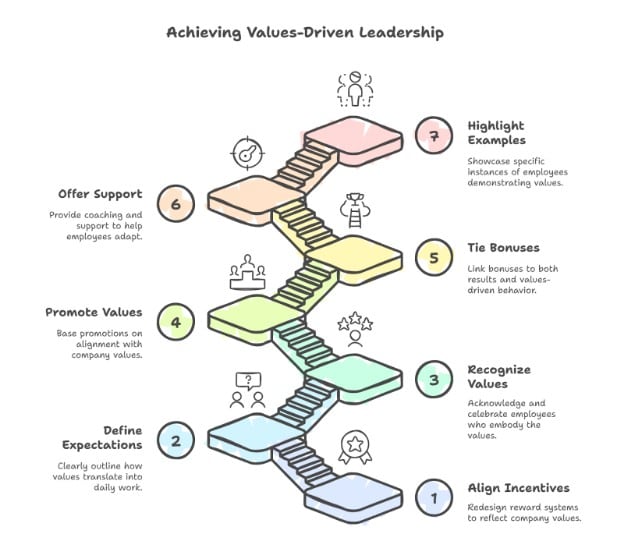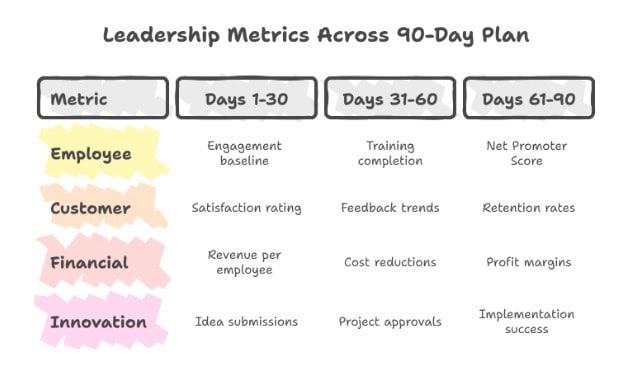
Values-Driven Leadership: The Competitive Advantage of 2025
Business leaders today face a critical choice. Do they stick with traditional leadership methods, or embrace a new approach that puts values at the center of everything?
Companies across various industries are realizing that traditional leadership styles are no longer sufficient.
Employees, customers, and investors want more than profits—they want leaders who actually stand for something.
Values-driven leadership has become the new currency of competitive advantage, as it fosters trust, enhances performance, and drives lasting business success.
This leadership style goes way beyond mission statements or slick marketing. It’s about making decisions based on core beliefs—and sticking to them, even when things get tough.
Organizations that master values-based leadership principles are seeing real results. They attract better talent, keep employees longer, and build stronger relationships with customers.
Companies that embed values such as honesty, inclusion, and responsibility into their daily operations prove more resilient in times of crisis. They also stay more competitive over time.
Key Takeaways
- Values-driven leadership creates a competitive advantage by building trust and improving business performance.
- Companies that align their values with daily operations attract better talent and keep employees longer.
- Leaders who make decisions based on core values build more resilient organizations that succeed during difficult times.
What Is Values-Driven Leadership?

Values-driven leadership entails guiding an organization based on a set of core values that inform decision-making, behavior, and interactions. Many leaders confuse this with mission statements or slogans, but it’s about real principles that drive action.
What It Is Not
Values-driven leadership isn’t a marketing campaign or PR stunt. Deep purpose isn’t just a slogan to display on a website.
It’s not about picking trendy values to please employees or customers. True values-driven leadership requires leaders to identify their authentic core values and stick to them, even when it’s inconvenient or expensive.
This approach stands apart from traditional leadership, which often prioritizes profits or results. Values-driven leaders don’t separate personal integrity from business decisions.
They maintain transparency in their actions and ensure that their decision-making reflects their stated principles.
What values-driven leadership avoids:
- Using values as empty buzzwords
- Changing principles based on convenience
- Separating personal and professional ethics
- Focusing only on short-term gains
- Making decisions without considering the impact on others
Authentic leadership development challenges leaders to examine their true beliefs. They have to commit to consistent action based on those principles.
Fettner Executive & Professional Career Coaching provides career coaching tailored to help leaders align their personal values with professional growth. Build clarity and resilience in your career path—contact us today to get started.
Why It Matters In 2025
Values-driven leadership has become essential for building trust and achieving long-term success in today’s business world. Companies with strong leadership values now outperform their competitors across multiple metrics.
Business is the most trusted institution globally (62%) in 2025, ahead of NGOs (58%), government (52%), and media (52%). Edelman
What makes values-driven leadership important in 2025?
Values-driven leadership is the new currency of competitive advantage because it directly impacts business performance. Companies with effective leadership programs show measurable improvements in three big areas:
- Productivity increases of 20-30%.
- Employee satisfaction significantly improves.
- Profitability beats industry averages.
Why do traditional leadership programs fail?
Research finds that 70% of leadership development programs fail because they focus on skills rather than values. That leaves leaders who are simply not authentic.
Values-based approaches actually build trust between leaders and teams. Trust is the foundation for long-term success in any competitive market.
What drives employee expectations in 2025?
Today’s employees want leaders who demonstrate clear values and a clear purpose. Companies with inclusive leadership teams retain top talent and spark innovation more effectively than traditional hierarchies.
Values-driven leaders create workplaces where people feel a sense of belonging and have a clear purpose.
What The Data Says
Research shows that many leaders hold false beliefs about values-driven leadership, which can impact their decision-making.
These myths hinder companies from utilizing ethical leadership as a competitive advantage.
U.S. employee engagement fell to a 10-year low in 2024 (31% engaged). Gallup.com
Common Myths To Address
Myth: Values slow down business decisions
Data-driven leadership research actually shows the opposite. Companies with strong values tend to make faster, more informed choices during ethical dilemmas.
Leaders don’t waste time second-guessing when they have clear principles to guide them. Values serve as a roadmap for making tough calls.
Myth: Customers don’t care about company values
Values-driven leadership has become the new currency of competitive advantage. Modern buyers research a company’s ethics before making a purchase.
Studies show that 73% of consumers are willing to pay more for products from ethical companies. This trend’s even stronger among younger buyers who drive growth.
Myth: Profit and purpose can’t coexist
Companies that incorporate values into their operations tend to achieve better financial results. Purpose and ESG initiatives now drive competitive advantage, not just compliance.
Ethical leaders inspire loyalty, which cuts hiring costs and boosts productivity across teams.
How to Turn Values Into Daily Actions

What is the most important step in values-driven leadership? Connect company values to daily decisions and employee actions. Authentic leaders treat values as strategic assets and hold people accountable for living them.
Align Incentives And Reviews With Behaviors
Leaders need to redesign their reward systems to align with their stated values. Performance reviews should measure how employees demonstrate core values, not just whether they hit targets.
Accountability starts with clear expectations. Companies need to define what each value looks like in daily work.
If “respect” is a core value, leaders should clearly outline specific behaviors, such as listening to all team members during meetings. That makes it real.
Key alignment strategies include:
- Adding values-based questions to performance reviews
- Recognizing employees who live the values
- Basing promotions on values alignment
- Tying bonuses to both results and behavior
Empathy matters here. Employees need time to adjust to new expectations, so leaders should offer coaching and support instead of jumping to punishment when people struggle.
The review process should highlight specific examples of employees showing company values in action. That keeps values from becoming just another abstract concept.
Put Values To Work Across The Organization
Values-driven organizations can’t run on good intentions alone. They need clear systems to integrate values into their daily work.
Start with hiring and training. Companies should seek individuals who share their core values. New workers require training that demonstrates how values inform their decision-making.
Make values visible everywhere. Put them on office walls, websites, and meeting agendas. When values are easy to see, people are more likely to remember and use them.
Teams work better when they share common values. Collaboration strengthens when everyone understands what matters most.
Workers trust each other more when they follow the same principles. That’s just human nature.
Use values in performance reviews. Ask workers how they live by company values. Reward people who make choices based on these principles—it matters.
| Area | Action |
| Hiring | Screen for value alignment |
| Training | Teach value-based decisions |
| Reviews | Measure value behaviors |
| Meetings | Reference values in discussions |
Values help drive innovation, too. When teams understand their core beliefs, they feel more secure in trying new ideas. They’ll take smart risks that align with the company’s principles.
Leaders should share stories about values in action. Real examples help workers see how to apply values in tricky situations.
Regular check-ins keep values alive. Teams can discuss how well they’re following their principles and address problems before they escalate.
Values work best when they guide both big and small choices across every part of the organization.
Through focused performance coaching, Fettner Executive & Professional Career Coaching helps managers and entrepreneurs apply values in daily decisions that drive trust, retention, and results. Strengthen your leadership advantage—schedule a session with us now.
What Leaders Should Track to See Real Results

Companies need clear metrics to see if their values-driven leadership efforts actually create a strategic advantage. A structured 90-day implementation plan provides a clear way to measure real progress.
90-Day Rollout Plan
Days 1-30: Foundation Metrics
In the first month, leaders should set baseline measurements. Employee engagement surveys reveal the state of value alignment at the outset.
Exit interview data highlights current retention issues. Customer satisfaction ratings help you see how outsiders view the company.
Revenue per employee acts as a productivity marker. These numbers set the stage for future comparisons.
Days 31-60: Implementation Tracking
The second month is all about adoption metrics. Training completion rates indicate the percentage of leaders who are actively participating.
360-degree feedback scores enable you to track behavioral changes as they occur. Team collaboration scores indicate that cultural shifts are taking root.
Decision-making speed provides a sense of operational improvement. You’ll want to keep a close eye on values-driven leadership development programs during this stretch.
Days 61-90: Impact Assessment
By the final month, it’s time to measure business outcomes. Employee Net Promoter Scores capture internal satisfaction.
Customer retention rates show whether you’re creating value on the outside. Profit margins reveal the financial impact.
Innovation metrics track creative output. Some say that purpose-driven companies outperform their competitors by 42% in long-term market value when they closely track these factors.
| Metric Category | Days 1-30 | Days 31-60 | Days 61-90 |
| Employee | Engagement baseline | Training completion | Net Promoter Score |
| Customer | Satisfaction rating | Feedback trends | Retention rates |
| Financial | Revenue per employee | Cost reductions | Profit margins |
| Innovation | Idea submissions | Project approvals | Implementation success |
Real-World Lessons From Coaching Leaders
Companies that invest in coaching their leaders see clear benefits. Goldman Sachs improved engagement and retention by teaching leaders to coach rather than command.
Cisco’s transformation under CEO Chuck Robbins is a big example of how coaching leadership works in fast-moving industries. The company leaned on coaching to help leaders adapt to market changes.
Leaders pick up essential skills through coaching programs:
- Active listening instead of just giving orders
- Asking better questions to guide team decisions
- Building trust through consistent actions
- Connecting daily work to company values
A leader can become a successful coach if they stick to the basics and apply them consistently.
Values-driven leaders who receive coaching begin to make decisions that align with their company’s core values. They stop treating values like wall art and actually use them to guide choices.
The coaching process helps leaders spot gaps between what they say and what they do. This kind of awareness leads to more genuine leadership.
Companies often find that coached leaders drive stronger team performance. Being a leader-coach enables you to build top-performing teams and makes you more valuable within your organization.
The best programs stick to practical skills, not just theory. Leaders have the opportunity to try new behaviors in real-life situations, with a coach providing support.
Marilyn Fettner’s Credentials Behind the Coaching
With 25+ years of experience coaching executives, managers, and entrepreneurs, Marilyn Fettner is a Licensed Clinical Professional Counselor (LCPC), Certified Career Counselor (CCC), National Certified Counselor (NCC), Certified Professional Values Coach (CPVC), and Master Career Development Professional.
Her expertise ensures that the lessons she shares aren’t just theory—they are grounded in practice and proven to drive measurable business results.
Clients describe Marilyn as “a lifeline,” “pointed and insightful,” and a partner who helps uncover new directions leaders hadn’t considered.
Conclusion
Values-driven leadership matters more than ever. It shapes workplaces where trust and integrity aren’t just buzzwords—they’re the norm.
Companies that actually live these values? They stand out in today’s market, without a doubt.
Key Benefits of Values-Based Leadership:
- Stronger employee engagement and retention
- Better decision-making processes
- Enhanced company reputation
- Improved customer loyalty
- Greater long-term profitability
Leadership in 2025 will demand a real focus on people. Change isn’t slowing down, but neither is the need for human values.
The best leaders don’t treat values as fluffy concepts. They lean on them when making tough calls—because that’s when it counts.
Implementation Steps:
- Define core organizational values clearly
- Integrate values into daily operations
- Measure progress through regular assessments
- Adjust strategies based on results
Values-based leadership gives companies a real edge in a world where trust and reputation are everything. It’s not just about looking good—it’s about being different where it matters.
Leaders who stick to ethical choices not only help their organizations but also benefit themselves. They ultimately shape entire industries and even communities through their actions.
The future? It belongs to the leaders who can mix innovation with genuine inspiration. Those who ground their strategies in absolute values will likely thrive—maybe even define what comes next.
Fettner Executive & Professional Career Coaching offers customized executive coaching to help leaders translate their values into tangible performance improvements in 2025 and beyond. Lead with confidence and integrity—contact us to schedule today.
Frequently Asked Questions
What is values-driven leadership?
Values-driven leadership entails making business decisions and managing people based on clearly defined organizational values, rather than solely focusing on financial targets or short-term goals.
Why is values-driven leadership important in 2025?
In 2025, values-driven leadership fosters trust, enhances employee engagement, reduces turnover, and strengthens customer loyalty—ultimately impacting profit and driving long-term growth.
How does values-driven leadership impact business performance?
Companies that operationalize values see measurable gains in profitability, engagement, and customer retention, while also reducing risks like misconduct and reputational damage.
What are examples of organizational values that drive results?
Examples include integrity, accountability, transparency, innovation, and respect—when embedded into daily decisions, these values guide behavior and create consistency.
How can leaders make values more than “just words”?
Leaders must translate values into observable behaviors, align incentives and performance reviews with those values, and use them as decision-making guardrails.
What metrics show that values-driven leadership is working?
Key metrics include employee engagement scores, voluntary turnover rates, customer satisfaction (NPS), ethical incident reporting, and financial performance trends.
Can values-driven leadership give companies a competitive edge?
Yes. Research shows that companies with an ethical and culture-focused approach consistently outperform market benchmarks, demonstrating that values are a tangible competitive advantage.
